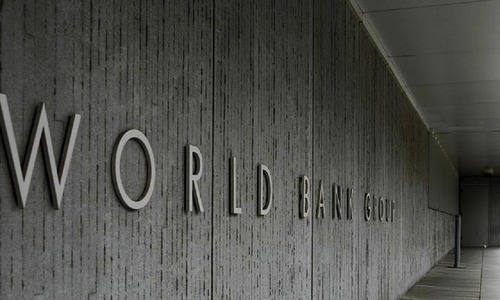ISLAMABAD: The World Bank forecast on Monday that Pakistan’s economy would actually perform even worse than what previous estimates had warned about, citing the Covid-19 fallout.
In its latest report, Global Economic Prospects, the Washington-based lending agency assesses the country’s economy was likely to go into the red this fiscal year and would be unable to recover even next year. It forecast a negative GDP growth of -2.6pc for the current fiscal year (2019-20) and -0.2pc during the next (20-21).
“Pakistan (-2.6pc in FY2019/20) and Afghanistan (-5.5pc in 2020) are both projected to experience contractions as mitigation measures are anticipated to weigh heavily on private consumption. Key labor-intensive export sectors are expected to contract sharply and recover only slowly”, the Bank said in its report.
This would be an even poorer performance when seen on the basis of World Bank’s April 12 forecast of -2.2pc and -1.3pc growth and an eventual recovery to 0.9pc.
The “output is expected to contract sharply in the fourth quarter of FY20, bringing the overall growth to -1.3pc”, the WB had said on April 12.
This comes in contrast to recent official estimates by authorities that put GDP going down by -0.4pc during the current year and returning to 2.3pc growth during the next fiscal year.
All other major economies in the region — India, Bangladesh, Nepal and Bhutan — would remain in the growth mode during fiscal 2019-20, even though all would suffer from the pandemic’s impact.
In India, growth is estimated to have slowed to 4.2pc in 2019/20, which ended in March. Output is projected to contract by 3.2pc in 2020/21, when the impact of the pandemic will largely hit and stringent measures to control the spread of the virus will heavily curtail activity, despite some support from fiscal and monetary stimulus.
Growth in Bangladesh (1.6pc in 2019/20) and Nepal (1.8pc in 2019/20) is expected to decelerate markedly in 2020 due to pandemic-related disruptions, including mitigation measures and sharp falls in exports and remittance inflows.
Nepal and Maldives will be hard hit by a drop in tourism.
The World Bank said the swift and massive shock of the coronavirus pandemic and shutdown measures to contain it had plunged the global economy into a severe contraction. The global economy will shrink by 5.2pc this year.
This would represent the deepest recession since World War II, with the largest fraction of economies experiencing declines in per capita output since 1870.
It noted that although South Asia had recorded a smaller number of Covid-19 cases than other regions, tourism activity has faded, and domestic pandemic mitigation measures were weighing heavily on short-term economic activity.
Deteriorating economic conditions in advanced economies and major emerging market economies were impacting export-related industries.
In addition, the incidence of Covid-19 cases was still rising rapidly in the region.
Industrial and services activity has plummeted in South Asia as a result of the mitigation measures and the collapse in global demand. Trade activity has sharply fallen. Consumption has been severely hindered as nationwide lockdowns were instituted in several economies.
Tourism worst affected
Tourism has become severely constrained, leading to sharp declines in arrivals in Bhutan, Nepal, Sri Lanka, and Maldives, which is heavily dependent on tourism.
Regional financial markets have been rattled by the global turmoil, leading to equity index declines, capital outflows, and heightened investor risk aversion.
One outcome has been that the effects of lower oil prices and more subdued economic activity is keeping inflation generally contained in the region. Central banks in virtually all major economies in the region have been able to take measures to stimulate economic activity.
GDP in the region is projected to contract by 2.7pc in 2020 as anti-pandemic measures hinder consumption and services and uncertainty about the course of the pandemic chill private investment.
Despite the relatively modest trade linkages South Asia has with advanced and major emerging economies, the sheer depth of the global contraction will weigh on economic activity.
The regional growth outlook is surrounded by high uncertainty. Risks to the outlook are heavily skewed to the downside. Despite the late and initially smaller Covid-19 outbreaks relative to some other regions, cases have shot up in India, Pakistan, Afghanistan and Bangladesh recently.
Besides the human toll, there is a risk that the pandemic will trigger a long-lasting rise in poverty, especially among the low-income countries.
South Asia has a high share of workers employed in the informal sector, which adds to the health and economic challenges of dealing with the coronavirus.
Published in Dawn, June 9th, 2020















































